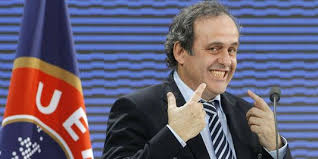By Andrew Warshaw
January 9 – The dream is finally over. Faced with the growing realisation that time is running out, Michel Platini, only a few weeks ago odds-on favourite to succeed Sepp Blatter, has been forced to withdraw from the FIFA presidential election.
The 60-year-old UEFA leader remains determined to fight the eight-year ban meted out to him by FIFA’s ethics committee last month but has resigned himself to the fact that he can no longer concentrate on being a contender ahead of the February 26 election.
Even if he were to clear his name, the campaign would be well into its final stretch by the time Platini could have resumed his candidacy, setting him at a distinct disadvantage.
“I’m withdrawing from the race,” Platini was quoted as saying, adding he didn’t “have the time or the resources to speak to electors, meet people and fight other candidates.”
“The timing is not good for me. I don’t have the means to fight on equal terms with the other candidates. I have not been given the chance to play the game. Bye bye FIFA, bye bye FIFA presidency.”
Quite possibly, too, bye bye Michel Platini if the appeals process, which would have had to be completed by the middle of this month for him to have stood any chance of getting back in the race, goes against him.
UEFA president since 2007, Platini submitted his candidacy just before the required deadline but as soon as he was banned over that infamous “disloyal payment” of SFr2 million he received from FIFA in 2011 for undeclared work carried out on behalf of Sepp Blatter, the odds of him taking over from the veteran Swiss (also banned for eight years) plummeted, leading the UEFA executive to take the protective precaution of shoehorning the 60-year-old Frenchman’s number two, Gianni infantino, into the battle to run FIFA and try and restore its shattered image.
“I’ve spent more time in hearing rooms than on football pitches speaking about 4-3-3 or 4-4-2 or football news,” said Platini. “Let’s wait and see what happens. But injustice is infuriating me and I am trying to fight it. “
With Infantino’s candidacy – unthinkable, even in his own mind, until pressed into action as a result of a quite remarkable chain of events – now confirmed once and for all, so Platini still hopes to save his own reputation, if not his career.
If FIFA’s own appeals panel upholds the ban against him, he will turn to the Court of Arbitration for Sport. But there is now a growing likelihood that he himself will have to be replaced as UEFA president at elections at the beginning of May.
In a series of media interviews, he nevertheless remained defiant.
“I have made the choice to dedicate my time to defending myself in a case that doesn’t even have any allegations of corruption, nothing at all.
“I’ve fought these allegations like I’ve fought for everything all my life, but I have been denied the possibility of competing this time.”
Both Platini and Blatter have long protested their innocence insisting they had a verbal agreement over the payment, made for work carried out when Platini was Blatter’s special adviser between 1999 and 2002 but only paid in 2011, just before Blatter was re-elected FIFA president.
FIFA’s ethics committee, whilst unable to prove corruption, dismissed the oral agreement argument as being unconvincing and banned them both for breaching several clauses in the ethics code including conflict of interest.
“I can’t have any regret … because things fell upon my head while I haven’t done anything wrong,” said Platini. “I’m struggling to understand what happened, unless there was a will somewhere to prevent me from bidding.”
He remains convinced he would have won hands-down if he hadn’t been sanctioned. “I had… about hundred of official letters of support from federations and about 50 pledges, in two days. But … how do you win an election when you’re prevented from campaigning?”
“Maybe I’ll come back in 20 years.”
Contact the writer of this story at moc.l1745177965labto1745177965ofdlr1745177965owedi1745177965sni@w1745177965ahsra1745177965w.wer1745177965dna1745177965

